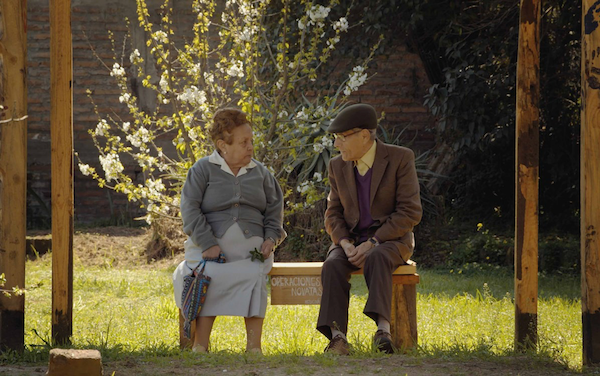Movie review by Greg Carlson
Maite Alberdi’s “The Mole Agent” is currently enjoying some award season love, with late January recognition from the National Board of Review in the Foreign Language Film group and steady buzz as a possible feature documentary Oscar contender and/or inclusion in the International Feature category as the official entry from Chile. Alberdi’s engaging movie was also broadcast this week on American television as part of PBS’s “POV” series, roughly one year after a premiere in the World Cinema Documentary Competition at the 2020 Sundance Film Festival.
“The Mole Agent” refers to the unlikely undercover spy of the title, a gentle octogenarian named Sergio Chamy. Sergio, seeking some adventure to occupy his time and his mind following the death of his wife, responds to an ad placed by a private investigator. The shamus, Romulo Aitken, seeks to plant the elderly widower in a nursing home to determine whether one of the residents is being treated with the appropriate care. Outfitted with a few key pieces of James Bond-esque gadgetry, including camera-enabled eyeglasses and pen, Sergio is dispatched, with the blessing of his daughter, to the facility.
Only 37 years old, Alberdi is a dynamic figure in documentary studies and practice. Like many nonfiction filmmakers, her production credits cover major tasks in editing, sound, and photography, and she continues to teach documentary filmmaking at the university level. Along with a co-authored book on theories of documentary, Alberdi has also written film criticism. Descriptions of her desire to capture the intimacies of interpersonal interaction and to consider the marginalized are central to “The Mole Agent,” the kind of movie you might initially think is about one thing, but by the end has transformed into something else.
Alberdi was able to collect her story elements by gaining access to the nursing home with her camera crew under the guise of making a broader movie focused on the day-to-day rhythms of the people living there. None of the residents knows anything about the mole’s true motives, and even though he does his best to please Romulo, Sergio’s mission soon takes a back seat to a series of more interesting connections between the spy and the women who are attracted to him in one way or another.
Alberdi plays out several threads that question longstanding patriarchal traditions of the Catholic church’s influence on society. The San Francisco Nursing Home, near Santiago, has a high ratio of women to men, something of an anomaly in Chilean eldercare. The most compelling of these stories is the one centered on lifelong virgin Bertita, whose religious devotion and earthly desires clash in a thorny conflict when she sets her sights on marrying Sergio — who has emerged as the most eligible bachelor in the place.
There is no doubt that Alberdi’s warm and sympathetic character study of Sergio deliberately capitalizes on humor derived from his bumbling ineptitude with the surveillance tech and his popularity with the ladies. Detractors have argued that the framing of the geriatric gumshoe’s questionable competence borders on exploitation, but followers of Alberdi’s work will counter that the filmmaker seeks to share with us a seldom-seen world filled with vibrant people desperately seeking autonomy, agency, and independence.
